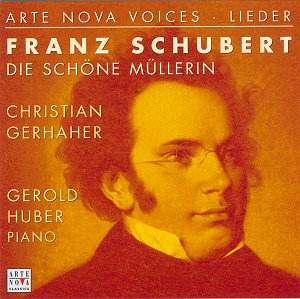It may seem unfair to start with the pianist,
but as a pianist myself I want to say at once that I think Huberís
playing is quite wonderful. Take no. 2, Wohin? There is
such transparency to the rippling 16th-notes, such evenness, together
with such sensitivity to the harmonic changes, so those sinking
progressions first heard at "Ich weiss nicht, wie mir wurde"
really register. The opening of Ungeduld, which in some
hands can sound a mess, is clear for once, and the agitation,
at a fairly broad tempo, is the more effective for it. He is alive
to every marking, every harmonic shift, and reacts imaginatively
to the many strophic songs. In Des Baches Wiegenlied the
gentle rocking figure which accompanies the song throughout actually
comes to sound like distant horns as the singer evokes the "Jagdhorn"
in verse 3. And he collaborates perfectly with the singer as well
as playing beautifully on his own account.
Is this all a preface to saying that the singer
is not on the same level? Fortunately not. Christian Gerhaher
has evidently thought a lot about the texts, on which he adds
a note of his own in the booklet. For years it was a truism that
Wilhelm Müller wasnít worth much as a poet, but this is the
second time recently Iíve encountered a revisionist view in print,
and Gerhaher reminds us that Heinrich Heine rated Müller
very highly. In order for us to appreciate better the poem and
the dramatic plot he has had the complete cycle printed in the
booklet, including the prologue, epilogue and three other poems
not set by Schubert. Unfortunately he perhaps didnít realise that
Ars Nova intended to print the texts without translations (only
the notes are translated) and my German is certainly nowhere within
reach of understanding them unaided.
It is not surprising, then, that his singing
always gives due attention to the words. His rather hearty way
with the first song led me to wonder if this wasnít going to be
an over-heavy interpretation, but perhaps he is misleading us
deliberately, for by the end it is his intimate, almost whispered
style of delivery which leaves an abiding impression. He, no less
than his pianist, finds a wide variety of expression in the strophic
songs. It is a more interventionist approach than Aksel Schiøtzís
classic performance (not strictly comparable as that was a tenor
version), but always musically so, somewhat in the Fischer-Dieskau
tradition. A comparison of a few of the songs with the most recent
recording by Andreas Schmidt and Rudolf Jansen found the latter,
both singer and pianist, a little penny-plain alongside the more
varied approach of Gerhaher and Huber. Possibly Schmidtís voice
is in itself the more beautiful instrument but in imaginative
and expressive phrasing Gerhaher surpasses him. If you have strong
feeling over tempi, I should warn you that Gerhaherís and Huberís
search for expression leads them to tempi which are generally
slightly below the norm Ė Schmidt and Jansen take just 61í 26".
I didnít personally find any of the slower speeds overdone.
There have been a good many fine recordings of
this cycle over the years; this splendidly engineered recording
can join them, without consideration of price; but you will need
to get translations from somewhere if you donít speak German.
Christopher Howell
